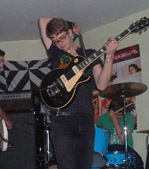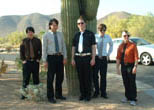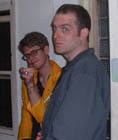
For the last year or so, Portland's Other Men My Age have been playing shows in and around the city to receptive audiences and rave reviews. Recently they struck a 3-record deal with Luminal Records in Atlanta. We caught up with them before their recent show at Nocturnal to discuss their recent signing and their view of the Portland scene, as well as the state of DIY and independent music across the country.
JT: So the standard background question: talk a bit about Other Men My Age came to be.
Dave: Brief synopsis: Shaine and Richard have known each other for a long time, Ken and I have known each other for a long time, we were from different parts of Ohio. I was in Harriet the Spy, Richard was in Three Studies for a Crucifiction, Ken was in Armstrong Secret 9--
Shaine: I was working at a car wash.
Dave: And these were all bands that played together a lot, but we never played music together. And Shaine is somebody that was often at shows in the scene that we were operating in. Then Ken moved here a few years, these guys moved here a couple years ago, and I moved here a couple years ago.
JT: What brought you guys to Portland?
Dave: For me it was just I wanted to leave Ohio, and I had friends out here.
Richard: During the Three Studies tour we visited Portland, and I loved it, I thought it was amazing, so I moved out.
Shaine: Rick said he was moving here, that was good enough for me. I'd never been anywhere really west of Chicago, so I figured it was about as far away as you could get. Not that I'm down on Ohio, because I still like Ohio. I love Ohio.
JT: How would you describe your band?
Dave: Um...
Richard: The thing about Other Men My Age is that we all have priorities outside the band, much like other men our age. We all have full time jobs, wives or girlfriends, careers and lives to think about outside the band, and I just think it's interesting that we all take time outside of our normal, busy schedules to get together and create something together.
JT: You just signed a deal with a label, right?
Dave: Yeah, it's called Luminal Records. They're based in Atlanta, and the guy that runs it seems very cool, seems like he is--
Richard: Remember, he's gonna be reading this.
Dave: [laughs] It seems like he's looking for the same things in a band that we're looking for in a label. You know, he's a cool, down-to-earth guy who's not afraid to spend money on recording and promotion and everything.
JT: You signed a two album and one EP deal, correct?
Dave: Yes. We're working on the EP right now, it should be out in August.
Shaine: We are recording it at Studio 111 in Portland, OR, a very nice recording studio by our friends David and Marshall.

JT: Being transplants, how do you guys feel about the Portland music scene?
Shaine: I think there's a huge opportunity for an amazing thing to occur here. I mean there are a lot of good bands here; for as many bands as there actually are here, a lot of them are good, I think. It seems like there's a unifying element that's missing from the equation to make it happen.
Dave: Another thing, too is that there's no sense of community.
Shaine: Yeah, there's no sense of community; I think there's starting to become one, as more and more bands are becoming friends. I think probably a similar thing was going on here ten years ago and it might be happening again. It seems that way, anyway. I want to take the opportunity that we have to help that to occur.
JT: This scene does seem to lack that sort of family feel.
Shaine: Yeah, I think us being from Ohio we're more accostumed to that sort of scene. Definitely more of a family, like the one you're from [in LA]. Also, I think people seem to have a hard time reacting, like maybe they're sort of afraid to react to music here. So many people are in bands that it's almost cynical and sarcastic to go see a band, and that's not the way it's supposed to be.
Dave: It's because we come from a place where the scenes that we participated in we sort of had a hand in creating. And now we've moved some place that has a lot of history with the arts scene and the music scene. When you're in a city that has a bigger population and a bigger or better music scene, there's more crap and there's less sense of community because it's so big. So from our small town point of view, the music scene here is kinda weird because, it's just different.
Shaine: Maybe it's because in small towns, you're sort of rallying against boredom.
Dave: yeah, exactly, because there's nothing else to do. Whereas here there's plenty to do.
JT: After the successes of indie and DIY labels like Dischord, Kill Rock Stars, K, Saddle-Creek, etchere's been a lot of flack in the past couple of years from scenesters that say it's selling out the DIY aspect of music just to sign with a label at all. Having just signed a deal, what are your feelings about that?
Shaine: I think it's complete bullshit, man. I don't see any problem with using resources that anyone is willing to give you because they believe in what you are trying to do and are trying to further realize your artistic vision or whatever, and I think that for anybody to say that that is selling out is so cop out.
Dave: The people who have always made that an issue have been very young, and many of them, more than half of them, don't have a prolonged involvement in the punk or underground music scene. There's people that, in there early twenties, get really into it and they're really militant about how you align yourself. But in the end, they're the ones working the office jobs and we're the ones in the bands. So I think it's a non-issue.
JT: So where would you say you draw the line?
Dave: Well, not everything is black and white. For instance, our contract is not particularly binding at all. It's very fair, and it's just a way for the guy that does the label we signed to to show bands what he can offer but also to protect himself from spending a whole lot of money on something that's not going to make any return for him.
Richard: Also the guy that's putting up this money is A) a good business man and B) believes in what we're doing.

Dave: I mean, there're a lot of DIY bands and labels that fucking rule, and they do a great job at what they do. And there are also people who are more business minded that do a good job. It's just that you kinda have to look at the way they do everything and decide who you're gonna be with. If you don't have to compromise what you do, you should do anything you can to expose as many people as you can to your music.
Shaine: And it doesn't mean you have to be on a Burger King commercial or whatever.
JT: But where does that end?
Dave: When you are on a label that tells you what to do. That's where it ends.
Richard: Or if you have little kids in a sweat shop packaging your cds.
Shaine: I guess it ends when you stop caring about what you're doing and you care about what you can get with what you are doing. I think that if you try any artistic endeavour, you should be open to anyone who is willing to take it on. I think more exposure is good because if you're doing something that entertains people, I think it's good to have the ability to expose your ideas to people that you might not have the ability to communicate with otherwise, and if you were limited strictly to making your own tapes and passing them out to thirty of your friends, you're not ever gonna really be able to reach someone half way around the world or even in another state. It's all communication, that's the most important thing.